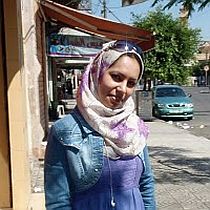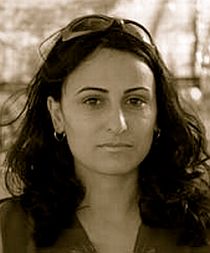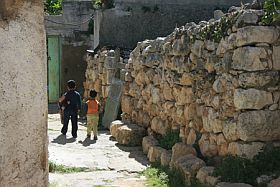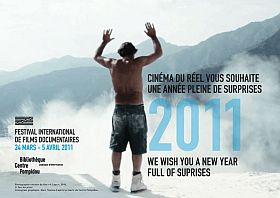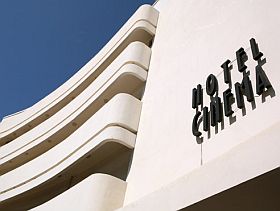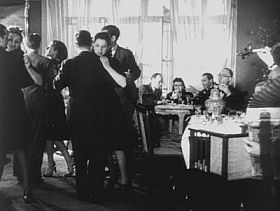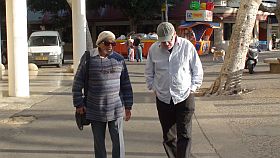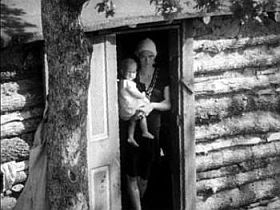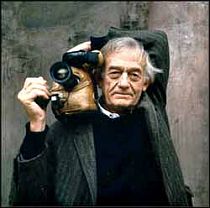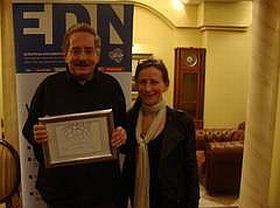The International festival of documentary films Cinéma du réel March 23rd -April 5th 2011 opened this Wednesday in Paris at le Centre Pompidou for the 33rd time. Readers of this blog are used to a broad coverage of this festival, unfortunately this year Tue Steen Müller and Allan Berg are not in Paris, so you will have to settle with my short account of what is going on.
The opening night Wednesday offered a tribute to the Syrian filmmaker Omar Amiralay, who passed away February 5th this year by showing his first film Film-Essay on the Euphrates Dam (1970) and his last film A Flood in Baath Country (2003). His friend, Syrian filmmaker Ossama Mohammad, made a beautiful introduction and the whole audience stood up for a minute of silence for the Syrians killed in the demonstrations that day.
In his introduction in the program booklet, the director of the festival, Javier Packer-Comyn, asks for a reconsideration of the notions we use around documentary film: “Ethics”, “Gesture”, “Documentary”, “Otherness”, “Cinema”, “Relationship to the world”, “Point of view”, “Just distance”, -these are precious words and must be used with accuracy, he states. We should re-discuss the fundamentals and “reflect on the meaning of all these undertakings. Why make documentaries? Why see them? Why show them? To who? How? Refine our practice, even the act of transmission. Accept the limits of festivals, these places that today accommodate so many different desires. Avoid that they become just pipes to be filled, recipes to apply. I think that the specificity of “Cinéma du reel” is salutary in the festival landscape of today. To centre ones choice beyond strategies and opportunism of circumstances sometimes offered by the diktat of world premieres that certain festival of our size limits itself to apply. Without any resignation, offer a program that is dense, open, generous in its approach, without pretention, and with an editorial project strongly directed towards the audience of the festival” (My translation!). And indeed it is another great program.
What I particularly like about the festival is its fine historic programs of “classic” American documentary. It is at Réel that I have seen Shirley Clarke, Jim McBride, Howard Alk, the Maysles brothers, over the last years. Again this year, I’m in for a treat: tributes to Richard Leacock, who so sadly died the day of the opening of the festival, and Leo Hurwitz, a privileged screening of invisible films and the program America is hard to see, the Conscience of a Nation. Here is the program I have made for myself so far:
Richard Leacock’s films, off course, because I have been part of the team who works for his book-project, and it is wonderful to see his films on a big screen: Canary Island Bananas (1935), Primary (1960), Happy Mother’s Day (1965), Chiefs (1969), Tilton’s Jazz Dance (1954), Pennebaker’s Company (1970) and Les oeufs à la coque (1991) made with Valerie Lalonde.
Invisible films: Portrait of Gina (1958), a lost TV-film by Orson Welles found in 1986 at the Ritz hotel in Paris and only showed once before. Followed by Introduction to the Enemy (1974) by Haskell Wexler, Tom Hayden, Jane Fonda, a film of their visit to North and South Vietnam.
Leo Hurwitz, The Young Fighter (1953), Native Land (1938-41), Strange Victory (1948) and Dialogue with a Woman Departed (1980).
Henchman Glance, a document by Leo Hurwitz re-edited by Chris Marker. During the Eichmann trial in 1961 (filmed by Hurwitz), the accused was shown the film Nuit et Brouillard by Resnais. The scene was filmed by Hurwitz and years later re-edited by Chris Marker, thereby confronting the views of three filmmakers.
In the international competition I will see Nous étions communistes (2010) by Maher Abi Samra. The filmmaker returns to Lebanon to reunite his old friends from the communist party to reflect over the fragmentation of the Lebanese society.
Then I will wait and see what the juries decide…
Allan and Tue, I hope you come back next year!
http://www.cinemadureel.org/index.php?lang=en
http://blog.cinemadureel.org/
For those of you who read French, I highly recommend to follow the French journalist, film critic and historian Jean-Michel Frodon’s blog Projection publique on Slate.fr. Here is his recommendation on what to look out for at Cinéma du réel with a good introduction to the American documentary pioneer Leo Hurwitz: http://blog.slate.fr/projection-publique/



